10 years of of suffering with POTS/ME/CFS come to an end:
Kiki shares how she cures herself despite a Lyme diagnosis
For Recovery Story Disclaimer, please see the main page here!
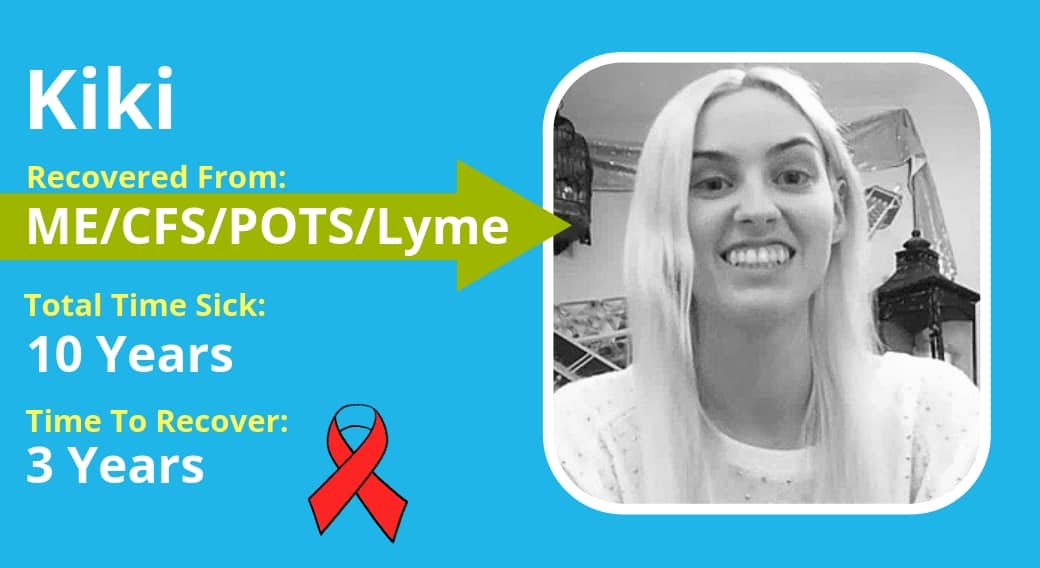
If you are sick a long time, chances are you searched for your cure for POTS, ME/CFS or chronic Lyme disease. But when nothing works, it’s easy to give up.
Kiki (@chronicallyhealed) somehow never lost hope that she would find a way to overcome POTS and ME/CFS. She tried many so-called cures for POTS but nothing worked.
She tells how she finally tried something that made a difference – only 10% difference, but an improvement on her POTS symptoms nonetheless.
From there, she kept building her recovery, making progress little by little until she realised she was fully cured from POTS and ME/CFS. Her experience with chronic Lyme disease is particularly interesting for anyone that has been diagnosed with that.
To receive Kiki's chronic illness inspiration daily, follow her on instagram or check out her website.
Transcript
Kiki: I was 15 years old. I just started high school. I had been totally healthy and very active up until then. One day, I just couldn’t get out of bed. I couldn’t make it to school anymore.
They just think, “Oh, you’re just faking it for the attention.” My hands and my feet were freezing cold all the time. I always had the nausea and trouble eating food at all. Bright lights – sometimes, I’d just have to wear sunglasses.
I really had the desire to just get out of the house and do anything. You know, even just going to the grocery store, that was a big event for me. You know, most of the time, I was homebound. I didn’t have any friends anymore. It was really lonely.
When I first got diagnosed with POTS, they told me I would get better in three to five years. After five years, I still wasn’t any better at all. I was worse. That was really hopeless, I felt.
I can’t describe it. It’s just like a feeling in my soul that I was going to get better. It was an exciting and scary and hopeful feeling. I just felt like, “Wow!” I had no idea why I felt that way. I just felt that it was like a sign from God that I was going to get better somehow. I didn’t know how it would happen.
You know, society really shows us you are what you do and what your accomplishments are and your achievements, but I felt like I was useless because I couldn’t contribute to society. I felt like I was useless. But then, through that, I just realised, “No, I’m valuable. I’m worthy just because I’m a person.” That’s what determines your worthiness as a person – just who you are and not what you do.
Dan Neuffer: Hi Kiki! It’s lovely to connect with you. How are things?
Kiki: I’m good!
Dan Neuffer: Fantastic!
Well, we managed to connect through the wonders of the internet. I think it was through Instagram where you have a large following. I want to thank you for coming to share your story today about your recovery.
Look, I guess the place I often start with people is when did things first go wrong? How long ago was it? How did you first know that something wasn’t quite right?
Kiki: I was 15 years old. I just started high school. This was back in 2006.
I had been totally healthy and very active up until then. One day, I just couldn’t get out of bed. I felt very light-headed and very nauseous. I couldn’t make it to school anymore.
Dan Neuffer: What happened? Presumably, you went to the doctor. What did they say?
Kiki: At first, it took them about a month to really realise what was going on. My heart rate was beating too quickly when I stood up, and my blood pressure was too low. All my blood just kind of drained and pooled in my feet. I just felt faint a lot.
Dan Neuffer: Did they find a cause? Did they give you a treatment?
Kiki: Initially, they diagnosed me with neurocardiogenic instability. They did that through the tilt table test. They put me on all these medications and none of them worked. About a year later, they did the tilt table test again, and that’s when they diagnosed me with POTS.
Dan Neuffer: That can’t have been a good year for a 15-year-old. What was that like?
Kiki: I missed quite a lot of school. Most of the time, I was homebound with a tutor. I did my classes remotely.
Dan Neuffer: What was it like? What did everyone say to you? Did people believe that you were ill?
Kiki: Not all. They just think, “Oh, you’re just faking it for the attention.”
Dan Neuffer: Crazy, isn’t it?
What happened from then on? Did the symptoms grow or change?
Kiki: I still had the light-headedness and nausea. Through the years, they got worse. I got more symptoms – like, the chronic fatigue was really bad, and I also had really bad anxiety.
Dan Neuffer: It must have been strange to get all of these additional symptoms. What do you think was driving the anxiety? Had you had anxiety before you got ill?
Kiki: No.
Dan Neuffer: Do you think it was just a symptom? Or do you think it was because it was so difficult being ill?
Kiki: I think it was just another symptom. It felt like I wasn’t worrying about a particular thing. I was like screaming in my brain, trying to call itself out, and I had no idea why.
Dan Neuffer: Absolutely.
What happened leading up to the first time we started? Was there a day when you suddenly went, “Oh, this doesn’t feel right?” How did that come on? Was it overnight? Was it gradual?
Kiki: It was overnight – like, night and day.
One day, I was totally fine. The next day, I just couldn’t sit up anymore.
Dan Neuffer: How confusing, isn’t it?
Kiki: Yes.
Dan Neuffer: You must have been going, “What’s going on?”
Kiki: Yes.
Dan Neuffer: Did anything happen leading up to the illness?
Kiki: No.
Dan Neuffer: If you think about the 12 to 18 months, did you have any major events? Did you have any physical things or medicines or anything that led up to this? Did it just come out of the blue?
Kiki: It was totally suddenly out of the blue.
Dan Neuffer: Then, 12 months in, you get a diagnosis of POTS. After that, you start to get chronic fatigue symptoms. Did you get a diagnosis of chronic fatigue syndrome as well? Or did they just keep the diagnosis of POTS?
Kiki: They kept the diagnosis of POTS. The chronic fatigue, I think, if it’s longer than six months, then it’s considered chronic fatigue.
Dan Neuffer: Tell me how your symptoms changed as time progressed after that. You got the fatigue. Did you start to get other strange symptoms at all? Sensitivities or anything like that.
Kiki: One thing, I noticed that my hands and my feet were freezing cold all the time. I remembered we had this metal table in the backyard and the sun heated it up really hot so I just put my hands on there just to warm them up, and my hands would still be warm five minutes later and it would be cold again. I just could not figure out why my hands and feet were so cold.
Dan Neuffer: Yes, it’s strange – the symptoms we can experience.
Kiki: Yes.
Dan Neuffer: Did you have any troubles with your gut?
Kiki: Yes.
Dan Neuffer: What was going on there?
Kiki: I always had the nausea. There was a point where I had trouble eating food at all. One thing that helped was the paleo diet – just eliminating all food that could cause inflammation in my gut. That helped.
Dan Neuffer: Was it like IBS? Was there constipation or diarrhea or a mix of both?
Kiki: There was nausea and stomach pains. They did all sorts of tests – like, the gastric emptying test and endoscopy. Everything was totally normal.
Dan Neuffer: Yes, it sure didn’t feel normal, eh?
Kiki: No.
Dan Neuffer: What were your parents saying through all of this? It must have been quite frightening.
Kiki: They were very supportive. They made sure I got to all my doctor appointments. They would drive me because I was not able to drive for a very long time. They were such a huge support to me. I thanked them so much just for driving me to each doctor appointment and really making sure that I was getting the right treatments.
Dan Neuffer: People often forget how important these things are. When you’re chronically ill, even if there is help, you can’t necessarily take advantage of it – unless you’ve got somebody to help you do that. That’s a big thing.
Did you have any sensitivities to light or sound or smells? Did that kind of thing happen?
Kiki: I had a little bit of light sensitivity. Bright lights – sometimes, I’d just have to wear sunglasses if there were bright lights or flashing lights.
Dan Neuffer: With your fatigue, did you find that it was always there? Or did you find a change? What did it feel like to have that fatigue?
Kiki: It was interesting because I went five years without experiencing fatigue and then I just got it suddenly.
Dan Neuffer: Okay. Five years, you had the POTS, and then the fatigue suddenly came in.
Kiki: Yes.
Dan Neuffer: When it came in, was it there all the time? Did you find that, when you did something, it got worse? Or did it get worse straight away? What was it like?
Kiki: It was pretty constant.
Dan Neuffer: What would happen if you exercised or anything like that? Were you still able to exercise or do anything? Or was the POTS too bad?
Kiki: Before I got the chronic fatigue, I could exercise. I really loved exercising. I felt like that helped a lot in strengthening my heart. But after I got the chronic fatigue, I just wasn’t able to exercise anymore.
Dan Neuffer: What’s life like? What were you doing with yourself? You were now five years ill. You were 20 years old. Tell me, how did you spend your days?
Kiki: It was really boring. I really had the desire to just get out of the house and do anything. You know, even just going to the grocery store, that was a big event for me. Most of the time, I was homebound. I didn’t have any friends anymore. They all graduated high school and went off to college. It was really lonely.
Dan Neuffer: Did you graduate at all from high school?
Kiki: I did graduate from high school – through homebound.
Dan Neuffer: How would you spend your days?
Kiki: I’d mostly just go on the internet, go on YouTube, watch movies.
Dan Neuffer: What do you think was your low point with the illness?
Kiki: It was probably right when I got the chronic fatigue. At that point, when I first got diagnosed with POTS, they told me I would get better in three to five years. After five years, I still wasn’t any better at all. I was worse. That was really hopeless, I felt.
Dan Neuffer: What treatments had you tried during this time?
Kiki: During that time, I had gone on fludrocortisone which is a POTS treatment and a lot of different medications like betablockers. I can’t even remember all of them, but they all made me worse. I had terrible side effects from it.
I had really bad headaches – the worst pain ever in my headache. I would throw up because of it. I would go off medication and I would be better. For a time, I just thought, “I don’t want to take any medications.” I was done with that.
In the meantime, I had neck pain, so I started going to a chiropractor. He noticed that my jaw as a little misaligned. They thought maybe there was some compression going on that’s causing the POTS, so I did orthodontic treatment where they fixed the alignment of the jaw. I was doing that, and I didn’t really know what else I could be doing.
Dan Neuffer: Do you have problems with immunity? Did you find that you were getting flus or cold symptoms often? Or were you getting swollen glands or anything of that sort of nature as well?
Kiki: Not too much. I mostly stayed inside most of the time. Sometimes, when I did go out, I would wear the medical mask. I knew that, if I did get sick, it would take me a month to recover.
Dan Neuffer: A basic little cold sort of thing would really wipe you out.
Kiki: Yes.
Dan Neuffer: What were the doctors saying when you were responding so badly to the medication? Did they give you any insight or suggestions?
Kiki: No. No cure. No cause.
Dan Neuffer: Goodness. That’s pretty tough to deal with emotionally, isn’t it? It’s one thing to be ill, but it’s another thing to be in this limbo where nobody knows what’s going on.
At that stage, did you still think you would recover? Or had you started to wonder whether you would stay sick?
Kiki: At that point, I was just taking it one day at a time. I wasn’t even thinking about the future. I didn’t know if I was going to get better or not, but I was prepared to live the rest of my life like this.
Dan Neuffer: Yes, that’s probably a good way to handle it. You don’t want to overthink it when you’re going through that.
Then, what happened? Obviously, we’re going for years now. After the chronic fatigue syndrome set in, that was five years in, how long after that was it that you had your turning point?
Kiki: I think it was about a year after I had the chronic fatigue. I can’t describe it. There was just a feeling in my soul that I was going to get better. It was exciting and scary and hopeful feeling. I just felt like, “Wow!” I had no idea why I felt that way. I just felt that it was like a sign from God that I was going to get better somehow. I didn’t know how it would happen.
Dan Neuffer: Yes, it is bittersweet, isn’t it? It’s kind of scary to get your hopes up, isn’t it?
Kiki: Yes.
Dan Neuffer: Had you been a spiritual person all along all your life?
Kiki: I’d say so, yes. But all that time just being alone, I had a lot of time to just reflect on my own self. I felt like I did grow very spiritually through the whole experience.
Dan Neuffer: Tell me more about that. How did the illness help you to do that? Did the illness help you to do that? Or was it just happening at the same time?
Kiki: I think it was the illness – through the illness. It helped me to do that.
I did grow up in the Christian church. I did believe in God. I just felt so hopeless during that time, but I just felt, you know, God is still good even though I feel sick. I just grew through that.
Dan Neuffer: Let me ask you, before we get to that, how did you feel about your illness and the symptoms? They’re with you all the time. It’s a bit like a bully, isn’t it? Always in your face.
Kiki: Yes.
Dan Neuffer: You mentioned the anxiety, although you described it really as a symptom which I totally understand, by the way. I totally get where you’re coming from. But it’s pretty tough emotionally when you have these symptoms all the time.
Did you find that you had strong emotional reactions when your symptoms got worse? Did it upset you a lot?
Kiki: No, I was so used to it by that point.
Dan Neuffer: Almost numbed out to it, yes.
You start to get this feeling – this insight that you’re going to recover. And then, what happens?
Kiki: Then, all of a sudden, I just happened to find a POTS treatment centre down in Texas. My brother just happened to be going out to college there and we were driving out there anyway. It was like, “Well, why not just try it out?” They did biofeedback therapy.
Dan Neuffer: Ah, very good!
Kiki: It helped me learn how to control my breathing and, with that, control my heartrate. Through that, it warmed up my hands. Somehow, breathing and pumping the blood through my body, my hands and my feet warmed up. That gave me so much hope because I didn’t even know why my hands were cold in the first place, and I learned I was just not breathing properly.
Dan Neuffer: It’s very powerful when you do something and something changes, isn’t it?
Kiki: Yes.
Dan Neuffer: It’s like, “Oh, this isn’t just a bunch of luck,” or whatever – something that will come and go. It’s like, “I effected this.”
Kiki: Yes.
Dan Neuffer: Tell me about this biofeedback. What did that involve? What did you specifically do?
Kiki: They had a heartrate monitor attached to my earlobe. And then, they had a little temperature that was attached to my finger to monitor the temperature of my fingers. And then, it was just a screen where it just goes up and down. You just breathe with it as the waves go up and down. It controls your heartrate variability.
When you breathe in, your heartrate goes a little faster. When you breathe out, your heartrate goes a little slower. Somehow, that just allows the body to pump the blood where it’s supposed to go and warm up my hands.
Dan Neuffer: Were you trying to synch your breathing with the screen? Is that what you were doing?
Kiki: Yes.
Dan Neuffer: It was looking at your natural heartrate variability, and then you were synching your breathing with that.
Kiki: Yes.
Dan Neuffer: Fantastic.
As you were doing that, did you feel anything whilst you were doing it? Did you feel it the first day? Did you feel it after a week? What was that like?
Kiki: It was pretty quick that I noticed it.
Dan Neuffer: What was the first thing? You noticed your hands warming up?
Kiki: Yes.
Dan Neuffer: What else happened with your symptoms? What else did you notice?
Kiki: That was pretty much the only symptom that that helped.
I would also try to stand up and do it as well because, when I stood up, my heartrate got so fast. Even after I left the treatment centre, there’s an app you can download, so I would do that and just practice every single day.
Dan Neuffer: Just on your phone?
Kiki: Yes.
Dan Neuffer: What kind of a sensor would you use?
Kiki: I bought the sensor – the little earlobe thing.
Dan Neuffer: Fantastic.
Now, with your POTS, let’s just talk a little bit about that and your symptoms of the POTS. When you would stand up, you would get tachycardia, right? You would get a racing heart.
Kiki: Yes.
Dan Neuffer: What did that feel like? To someone who hasn’t had it, how would you describe it?
Kiki: I just felt like I had to lie down. I actually never fainted. I just could tell. If my vision would start to black out and my hearing would just get fuzzy because of all that blood draining from my heart, I would just be like, “I need to lay down.”
Dan Neuffer: Your heart – did it feel like it was going to jump out of your chest? Was it just racing? How did it feel in your chest?
Kiki: I would say it was just racing. I know some people get over 200 beats per minute. I don’t think mine was ever that fast.
Dan Neuffer: You just felt it racing.
Kiki: Yes.
Dan Neuffer: Now, besides the POTS and the chronic fatigue, you also had a diagnosis of Lyme, is that correct?
Kiki: Yes.
Dan Neuffer: When did that come? Was that before the chronic fatigue syndrome or after?
Kiki: That was after.
After I did the biofeedback therapy, it was maybe about a year later. I was part of these POTS (22:48 unclear) groups. A woman on there was recommending that everyone with POTS get a Lyme test because she had POTS for a long time, and she was diagnosed with Lyme. For all these other people on this group, the same thing was happening.
It was still my paediatrician because I was under 18 when I got sick. She knew my whole story with the POTS. I asked her for a Lyme test. She was like, “What? No, you don’t have Lyme. This is nothing.”
She thought it had nothing to do with each other, but she got a Lyme test for me anyway. It was the Western blot test. It came back positive. She was just shocked. She was like, “I’m getting all my POTS patients this test now.”
Dan Neuffer: Interesting.
This was a year after you had the test. In that year, did you continue to have the biofeedback? Or did you just do it at home?
Kiki: I just did it at home.
Dan Neuffer: How did your symptoms improve?
Kiki: It was mostly just the blood pumping and the circulation issues.
Dan Neuffer: You still had the fatigue?
Kiki: Yes.
Dan Neuffer: You still had the fatigue. Would you still get the POTS symptoms – the wooziness when you stood up?
Kiki: Yes.
Dan Neuffer: It was better, but it wasn’t gone.
Kiki: Yes.
Dan Neuffer: At least it was a step in the right direction, eh?
Kiki: Yes.
Dan Neuffer: You must have been grateful. Did you consider getting more biofeedback to try and get better results?
Kiki: No.
Dan Neuffer: You just figured that was as far as it would take you?
Kiki: Yes.
Dan Neuffer: Then, she diagnosed you with Lyme. How much better do you think you were at this stage compared to when you went to do biofeedback? Before you did the biofeedback, what percentage recovered were you then and what percentage recovered were you a year later?
Kiki: Before I did the biofeedback, I was 100 percent sick. After the biofeedback, maybe 10 percent better – not that much – but, at the time, that’s a huge deal for a sick person.
Dan Neuffer: It gives you hope, doesn’t it?
Kiki: Yes.
Dan Neuffer: That’s really a huge part of the journey – having some kind of hope that things can get better. Had you heard of other people who had recovered? Had you come across positive stories or anything like that?
Kiki: No, I don’t think so.
Dan Neuffer: That makes it pretty tough, doesn’t it? No wonder you were like me – motivated to share these kinds of experiences.
Kiki: Yes.
Dan Neuffer: Then, the doctor diagnosed you with Lyme. You must be seven years in now. Is that right?
Kiki: Yes, six or seven years.
Dan Neuffer: What happens next? How do you progress from here?
Kiki: The protocol for Lyme disease is you are put on antibiotics for 30 days and that’s it. They sent me to the infectious disease specialist. I was asking, “Is this related to POTS?” She said, “No.” I asked, “After 30 days of antibiotics, I’ll be better?” She’s like, “Yes.” “Do I have to take another Lyme test to see if it’s gone?” She’s like, “No, you’ll just be better.” Of course, after 30 days, I felt even worse.
I went to a different infectious disease specialist. He was Lyme literate. He put me on antibiotics. He continued it for about seven months. I still was not better. I was just getting worse and worse. Eventually, my insurance wouldn’t pay for it anymore. They said being on antibiotics for that long is really dangerous, so I just went off of it. I didn’t really know what to do after that.
Dan Neuffer: When it got worse, what got worse specifically?
Kiki: All my symptoms – the chronic fatigue was probably the worst. My digestive system got worse.
Dan Neuffer: What was life like at this stage? You were pretty much housebound?
Kiki: Yes, I was.
I was going to the community college. I was taking class in a semester. It wore me out, but I was just really determined to go to that one class.
Dan Neuffer: You want to do something, don’t you?
Kiki: Yes.
Dan Neuffer: I totally get that. I don’t think people realise just how tough a slog that is – that one class. It’s like you’re doing three degrees at once.
Kiki: Yes.
Dan Neuffer: Then, what happens? This is not sounding like a great story. This doesn’t sound very positive yet. How did you turn it around? What happens?
Kiki: The infectious disease specialist that I was seeing was doing a lot of research with POTS and Lyme disease. He found that, in a lot of these patients, they had blockage in the jugular veins. If you would press on those veins, you wouldn’t feel a thing because you’re not getting that blood flow.
And so, they did an ultrasound on my jugular veins. They found a valve there. It just wasn’t working. My blood was flowing backwards. They said the Lyme had accumulated there. The way to get rid of that was to do this surgery.
It was called a jugular venoplasty where they would go in there with a balloon and open those veins back up. That was minimally invasive. They went through a vein in my leg. It went through my heart and it just kind of opened those veins up there.
While they were doing the surgery, they were checking other veins to see if they were compressed, and they were, but they couldn’t do anything about it because it was being compressed by my spine or just bones, so they couldn’t do the balloon there.
After that, they recommended that I go to this special chiropractic technique. They didn’t crack my neck or anything. They just pressed in different spaces. After a while, that really helped me. It got rid of my neck pain. I was able to sit up better. My symptoms got a little better after that.
Dan Neuffer: What about the surgery? Did the surgery have any impact?
Kiki: I think so. It’s so hard to tell. It did feel like it was so gradual.
Dan Neuffer: It wasn’t obvious after the surgery that you felt better right away?
Kiki: Yes.
Dan Neuffer: After surgery, it was pretty much the same. Is that what you’re saying initially?
Kiki: It was a little better.
Dan Neuffer: A tiny bit better. And then, you started doing this chiropractic work?
Kiki: Yes.
Dan Neuffer: Did that make it just a little bit better or a lot better?
Kiki: I was probably about 50 percent better by that point.
Dan Neuffer: How long did you do that chiropractic work?
Kiki: A few years.
Dan Neuffer: Did you do anything else during this time?
Kiki: Around that time, that was also hen I tried the paleo diet. That really helped, too.
Dan Neuffer: You went on a paleo diet and did these chiropractic treatments. Can you describe these chiropractic treatments? You were saying they were just like massaging? Or they were gentler than neck-cracking?
Kiki: Yes, it was called NUCCA chiro. I don’t know how they do it. They just press on certain areas and measure the length of your legs and where it’s all aligned. They put these pressure points on there and try to align it along. I guess it just opened up my veins there and helped with the POTS.
Dan Neuffer: Did you ask them what their experience was with other patients with POTS?
Kiki: I remember, for the surgery, I was one of the few POTS patients that got it done. I was really young. Most of the other patients there were older and were getting it for different reasons. I was one of the first ones who did that treatment.
Dan Neuffer: But the chiropractors themselves didn’t have specific experience with POTS people?
Kiki: I don’t remember.
Dan Neuffer: You were seeing them for what – two or three years? By this stage, you also did the paleo diet. Did you do anything else?
Kiki: Not at that point.
Dan Neuffer: But you got to about 50 percent better. This is good!
Kiki: Yes, and I did try a lot of other treatments that didn’t help.
Dan Neuffer: What kind of things?
Kiki: I did laser therapy treatment. A lot of times, they use it to reduce inflammation with the lasers. This one said they knew the frequency of the Lyme disease and then then would enter that into the laser, and they will try to target it, but I didn’t really feel like that helped at all.
I saw a holistic naturopath doctor. It seemed like it helped, but it didn’t help significantly.
Dan Neuffer: What did they do?
Kiki: The holistic doctor did treatments. I think it’s homeopathy. Different treatments with that.
What else did I do? It’s hard to remember.
Dan Neuffer: Did you try acupuncture or any other complimentary therapy?
Kiki: I didn’t have a very good reaction to that. I had really bad anxiety. I tried it a couple of times, but both times it happened, so I’m like, “I don’t want to do this treatment.”
Dan Neuffer: Kind of a slow boil – three years, 50 percent better. 50 percent better is 50 percent better. You must be happy, right? That’s great.
At this stage, did it plateau? Did the improvement slow down?
Kiki: Yes, it was kind of the same, but I was really happy with it because, being 50 percent, I could do 50 percent more things. I learned how to drive, and I was able to drive myself. I was able to make friends again. I started going to this college group at my church. Every week, I had to push myself to go. I was happy even though I wasn’t 100 percent better.
Dan Neuffer: At least you were functioning. You got some life, right? Much different than just being stuck inside.
Let me ask you. You mentioned the paleo diet. When you made the change to go to the paleo diet, did you find that that was difficult? Did it have any negative impacts on you in the beginning?
Kiki: No, it was a really easy change for me because my stomach felt better almost immediately. All these breads and carbs and stuff. It was so easy for me to get that out of my diet just because it helped me feel so much better.
Dan Neuffer: That was the main thing. The gut symptoms went away.
Kiki: Yes.
Dan Neuffer: Now, what do you do? 50 percent down the road and things are sort of slowing in terms of the progress. What do you do now to take it to the net level?
Kiki: I just happened to find this naturopathic doctor who worked with a lot of POTS and Lyme patients. She did IV therapy.
First, I got a bag of saline which helped with the POTS because I had the hypovolemia – the low blood volume. The second bag was Vitamin B-complex, Vitamin D, calcium, a little bit of magnesium, and then glutathione. I started doing that maybe twice a week. I started feeling better.
I kept doing it. I started feeling better and went down to just doing it once a week. Eventually, it was once every other week. Then, I just started doing it whenever I felt symptomatic. I would go in there every month or so.
I feel like that was definitely one of the treatments that helped me the most.
Dan Neuffer: Was it expensive?
Kiki: Yes.
Dan Neuffer: Were all the treatments expensive? Were some more expensive than others?
Kiki: They were all very expensive. Most of the time, the insurance wouldn’t pay for it at all.
Dan Neuffer: You were getting these infusions. You were still continuing with the chiropractic? Or did you stop?
Kiki: It probably overlapped.
Dan Neuffer: Then, what? To what level did that take you?
Kiki: I felt almost pretty much better by then – a few years after that.
Dan Neuffer: You did these infusions for a couple of years?
Kiki: Yes.
Dan Neuffer: That’s a lot of infusions, eh? You must have felt like you needed a permanent tap or something.
Kiki: Yes.
Dan Neuffer: For how long did you do it twice a week and once a week?
Kiki: A few months, I think.
Dan Neuffer: A few months, twice a week?
Kiki: It’s hard to remember.
Dan Neuffer: What about once a week? Did that last for a whole year or a couple of years? Was it just for six months?
Kiki: A few months.
Dan Neuffer: Then, you would just have it once every few months, is that right?
Kiki: Whenever I felt like I needed it.
Dan Neuffer: Did you find that certain things would bring your symptoms on?
Kiki: I guess stress would bring it on. Sometimes, watching a loud movie or a high-action movie was stressing to my body. It’s hard to explain. If someone was yelling, my heart would start racing again and it made me more symptomatic.
Dan Neuffer: You did these intravenous treatments and the chiropractor. Everything slowed down and you approached a full recovery. How did you feel if you had little setbacks or symptoms coming on?
Kiki: I just kept moving forward. I really felt like I was going to be healed 100 percent. I just kept moving forward.
Dan Neuffer: Were you scared that when you’d get symptoms that maybe you’d have a setback or that you were going to get really sick? Did you have any major setbacks along the way?
Kiki: I did.
One of the major setbacks I had, there was a point I just could not eat food at all. I still don’t know why. That was it. I had lost a lot of weight. I was really scared at that point because I thought I was going to die. I was just so underweight. Eventually, I got over that.
Dan Neuffer: Was that before the paleo diet?
Kiki: That was after.
Dan Neuffer: What do you think triggered that? Why did that suddenly come on?
Kiki: I don’t know. Still to this day, I can’t figure it out.
Dan Neuffer: You were doing well. You were on the paleo diet. Your gut symptoms were going down. Suddenly, out of the blue, you got sensitive, is that what happened?
Kiki: Any food I ate, I just had terrible stomach pain and terrible nausea.
Dan Neuffer: When you had other setbacks, what happened? Did you just get a sense of faith that you were going to be okay? There’s a lot of fear involved. It’s like your whole adult life at this stage. How long were you sick in total?
Kiki: Ten years.
Dan Neuffer: Obviously, the last two or three years, you were reasonably well – over 50 percent, I guess.
Kiki: Yes.
Dan Neuffer: You did the IV and that was pushing you towards the 100 percent.
As you were doing that, if you get a flare up of symptoms, I just wonder what’s going on in your head because people get so scared.
Kiki: I didn’t really set a time limit for myself to get better. I just thought, “Well, I have the rest of my life to get better. Progress is progress – no matter how slow it takes.” If I’m going to be sick another year, then I’m going to be sick another year. I’ll just have to keep moving forward.
Dan Neuffer: Makes sense. Focus on the progress.
You’ve done from zero to 50, from 50 to 70. It’s all good, right?
A lot of people find that, when they get those symptoms flare up, it just freaks them right out. They think, “Oh, no! I’m going to go all the way back again!” Did you ever have those moments? If not, what do you think helped you not to think that way? I’m kind of putting words in your mouth. I apologize.
The first question, did you ever have those sorts of thoughts?
Kiki: That I would not get better?
Dan Neuffer: Yes, or that you would slide back really badly?
Kiki: No, I just really felt I was going to get better.
Dan Neuffer: Awesome. It’s a pretty scary time, especially when you had all that weight loss. That would have been particularly unsettling.
What do you think helped you to deal with all of this?
Kiki: There were a few times when I did go to see a counsellor. I tried a few different ones. I found one who was familiar with chronic illnesses and POTS. Just talking about it really helped. I also made some really good friends at the church. Just talking about my feelings and how I’m feeling throughout the illness helped me heal emotionally. I feel like healing emotionally also helped me heal physically.
Dan Neuffer: Absolutely.
You were saying, obviously, stress was impacting your symptoms and making your symptoms worse. Did you find that, when you did physical things, things would get worse – like, if you pushed yourself too much?
Kiki: Yes.
When I was going to the college group, it was once a week. It was just a couple of hours in the evening on Thursdays. The whole day on Friday, I would just be in bed – the whole day. I had to recover.
Dan Neuffer: Again, many people then become fearful of going to do these things. Did you not get a bit disconcerted by that kind of thing?
Kiki: I just knew I had to keep moving forward. I had to keep doing it. I couldn’t get better just not trying.
Dan Neuffer: Did you ever think that maybe you wouldn’t go on a Thursday because you were going to pay for it on a Friday?
Kiki: Yes.
Dan Neuffer: Did you not go sometimes?
Kiki: Yes, there were times when I just couldn’t. Sometimes, even halfway through, I had to call my mom to pick me up.
Dan Neuffer: It really knocks your confidence, doesn’t it? You’re so vulnerable in the world when you’re like that.
Kiki: Yes.
Dan Neuffer: What do you think helped you? Do you think the people around you had a big impact on keeping it positive? Because it strikes me that this is a terrible adversity for a young girl to go through. I’m sure you had moments when you handled it terribly, but you sound like you had a great attitude – even after so many years of suffering. I’m wondering, what do you think was key for you to allow you to do that?
Kiki: I don’t know.
Dan Neuffer: Do you think your faith had anything to do with it?
Kiki: Yes, and just faith that I was going to get better.
Dan Neuffer: Because you mentioned earlier you had that religious moment where you felt God had spoken to you. Is that something that stayed with you afterwards? Did you always stay connected to that feeling?
Kiki: Yes, I feel like I just knew I was going to get better even after a setback. I just figured that’s the path to healing. It’s full of setbacks.
Dan Neuffer: That’s awesome. That’s really awesome.
How did you know when you were fully well? Is it the moment where you suddenly go, “Hey! I’m there!” or does it come gradually on you? Did you find that you did something in particular and you go, “Wow! I can’t believe I’m doing this!” because you had never done it before? What was that?
Kiki: It did happen very gradually. A lot of times, I thought I was better. “I was able to drive. I can drive now!” I felt like I was totally better. I still had symptoms. I was still debilitated by them. But I don’t know. It was hard to tell when I was better, but I did, eventually. Just one day, I felt better. I noticed that.
Dan Neuffer: It took all in all ten years, is that right? How long have you been well now?
Kiki: About two years.
Dan Neuffer: Tell me, what have you been able to do since you got fully well? Can you exercise now? Can you work? Can you study?
Kiki: Yes, everything!
Dan Neuffer: You’re doing all of that?
Kiki: Yes, I love going to the gym. I run on the treadmill, and I have a smile on my face. I can’t believe it. I’m probably the only person smiling at the gym. The driving was a huge part. Even when I’m stopped at a stoplight, I’m just smiling. I’m just so happy that I’m physically able to drive.
I started a little part-time job. I started going back to school. I did graduate with my associates degree when I was sick – just going to one class a semester. It took me seven years to get my associates degree.
Dan Neuffer: Well done! I’ll tell you, that’s a real sign of determination! Good for you!
Kiki: After I got better, I just feel like I want to share my story. I want to share what happened to me. I was really involved with the church, so I started taking online courses for Christian leadership. I really hope to someday have a ministry for people with chronic illnesses because I didn’t really feel like there was one for me. I just want to do that. It’s full-time schooling. It’s all online courses, too. Then, I can do my modelling part-time too on Instagram.
Dan Neuffer: Fantastic. It sounds like you’ve got a full schedule.
What gifts do you think you’ve received from the whole experience?
Kiki: Compassion, I guess.
You know, society really shows us you are what you do and what your accomplishments are and your achievements, but I felt like I was useless because I couldn’t contribute to society. I felt like I was useless. But then, through that, I just realised, “No, I’m valuable. I’m worthy just because I’m a person.” That’s what determines your worthiness as a person – just who you are and not what you do.
Dan Neuffer: How did you find that? I appreciate what you’re saying – deeply – but I’m like, “How did you manage to do that?” You’re lying there, housebound for years. You can’t go anywhere without feeling sick, having to call mum to rescue you. We’re talking nearly a decade. How do you find this? What was your process? Did anything help you? I’m just wondering. How does that happen? Because not everyone does that journey.
Kiki: I was very reflective. I had all this time on my hands. I did pray a lot. Through reflecting with prayer and seeking the truth and insights, I don’t know.
Dan Neuffer: Did you read a lot?
Kiki: Not really, no.
Dan Neuffer: Do you think that this was something that happened early on in your journey? Or was this later on that you found this?
Kiki: Probably later on.
Dan Neuffer: Do you ever worry about the illness coming back or things like that when people say negative things like that to you? How do you feel about that?
Kiki: The Lyme bacteria is still in my blood.
Dan Neuffer: You had a test to confirm it’s still there?
Kiki: It could come back, but I don’t know. I don’t know the future.
Dan Neuffer: Isn’t that interesting? You haven’t had any treatments in years, right?
Kiki: Yes.
Dan Neuffer: You have no treatments. The Lyme bacteria is there, but it’s not creating a problem for you. That is a really powerful insight to share. Obviously, people talk about how things can get worse and things like that, but why would it have to? It doesn’t have to, does it?
Kiki: Yes.
Dan Neuffer: Do you think you’ve learned anything out of your experience of the illness in terms of how you live your life that makes it less likely that you would get a chronic illness?
Kiki: Through the whole experience, I did learn a lot about health and healthy living. I still stay away from gluten and sugar because the Lyme bacteria can feed on those, so I stay away from that. Exercising still really helps.
Dan Neuffer: Just looking after yourself – physically and emotionally – I would imagine.
Kiki: Yes.
Dan Neuffer: Kiki, I love your story. Tell me, what is your message to people?
There’s a lot of scary stories out there – whether it’s CFS, POTS, fibro, and Lyme. You obviously went through a long time of antibiotics, and it didn’t do anything. You read all of these horror stories. The internet is scary, right? What’s your message to people who are still freaked out about all of this?
Kiki: Just keep moving forward.
Dan Neuffer: Stay focused.
Kiki: There was a point when I really thought I was going to die. It is really scary. I just really feel like that’s part of the journey of healing – going through all of that. Just keep moving forward. Even though it gets really tough, and it gets really scary. Even if you feel like you’re going to die, the only way to get where you’re going is to move forward.
Dan Neuffer: It sounds really simplistic, but there’s such power in what you say. It’s so easy in life to overcomplicate things. At the end of the day, what choice have you got? People often tell me this when they recover. They say, “What choice did I have? I had to do something to keep moving forward.” I find people are often at their worst before they start to get better because they find that motivation/desperation.
Kiki: Yes.
Dan Neuffer: Thank you very much for sharing your story. I really appreciate it. I think it’s amazing what you have done. Where can people follow you or find you?
Kiki: I’m mostly on Instagram at chronicallyhealed.
Dan Neuffer: Fantastic. We’ll include a link underneath so people can see little snippets of wisdom which I see all the time. They really reflect that you’re somebody that’s lived. I can see the wisdom that comes through in your posts. They pop up on my Instagram every day. It’s great to see.
Thank you very much for sharing your story, Kiki.
Kiki: Yes, thank you for reaching out to me and interviewing!
Dan Neuffer: You’re welcome! Cheers!
Please leave a comment at the bottom of the page!
Here are some social media images for sharing:
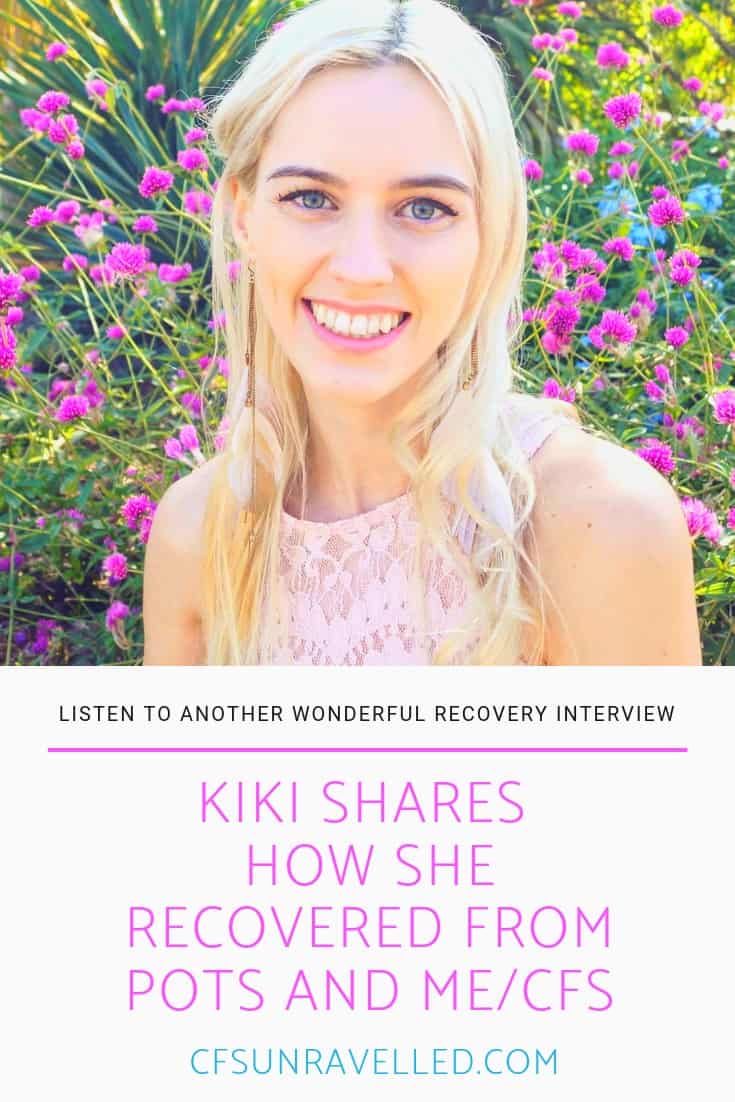
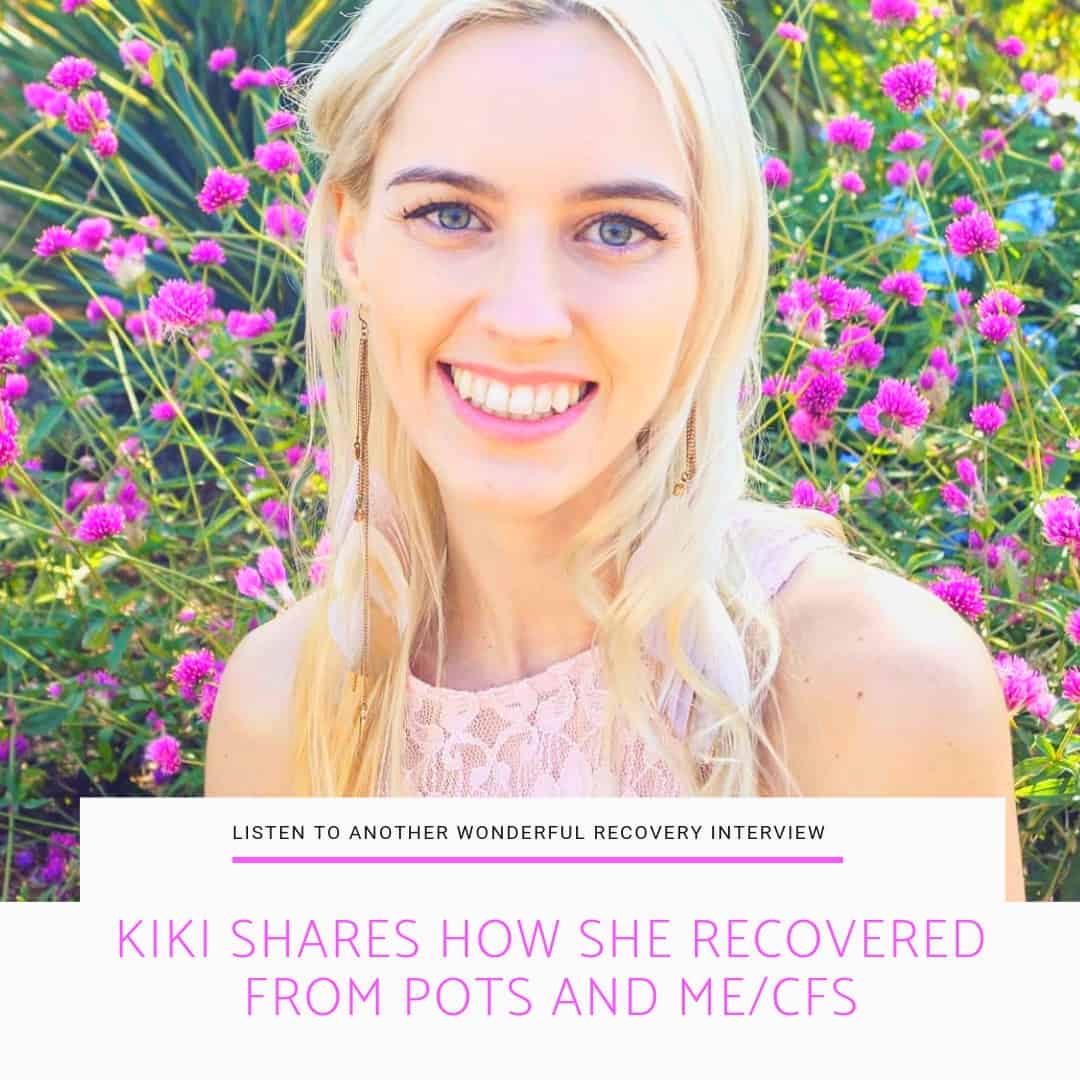
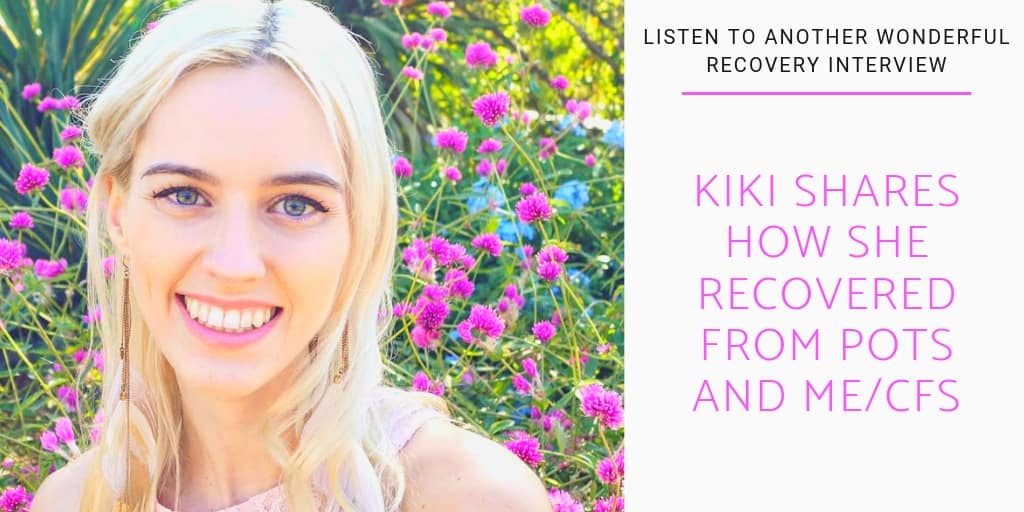
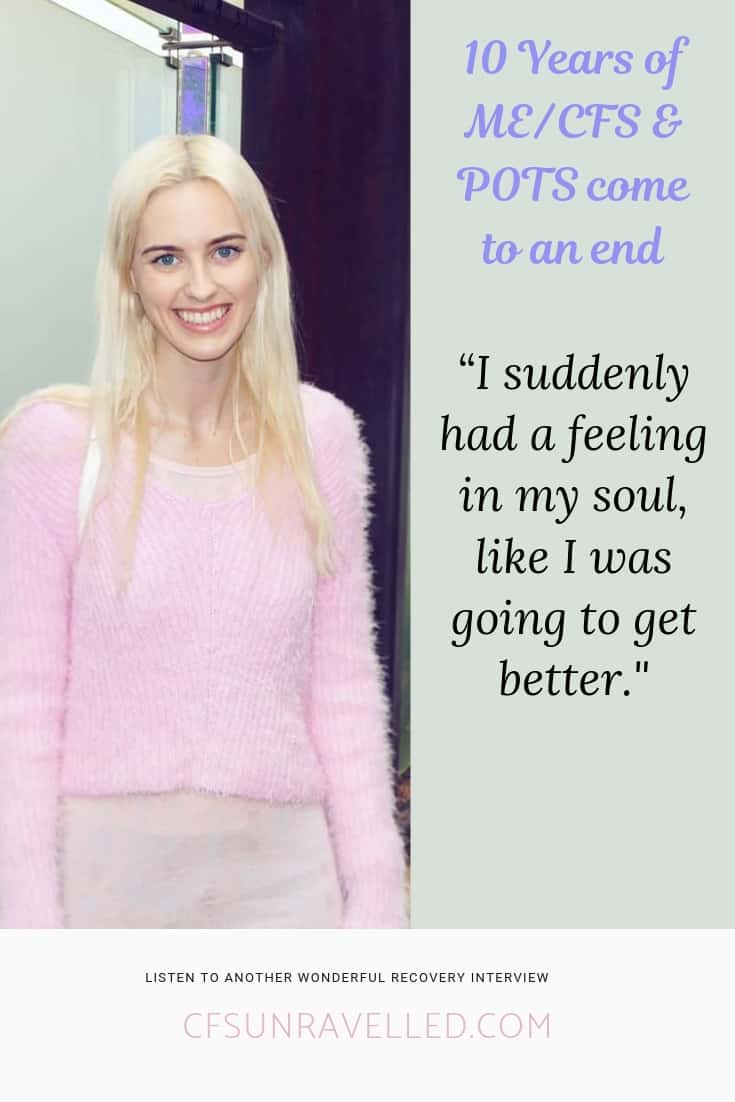
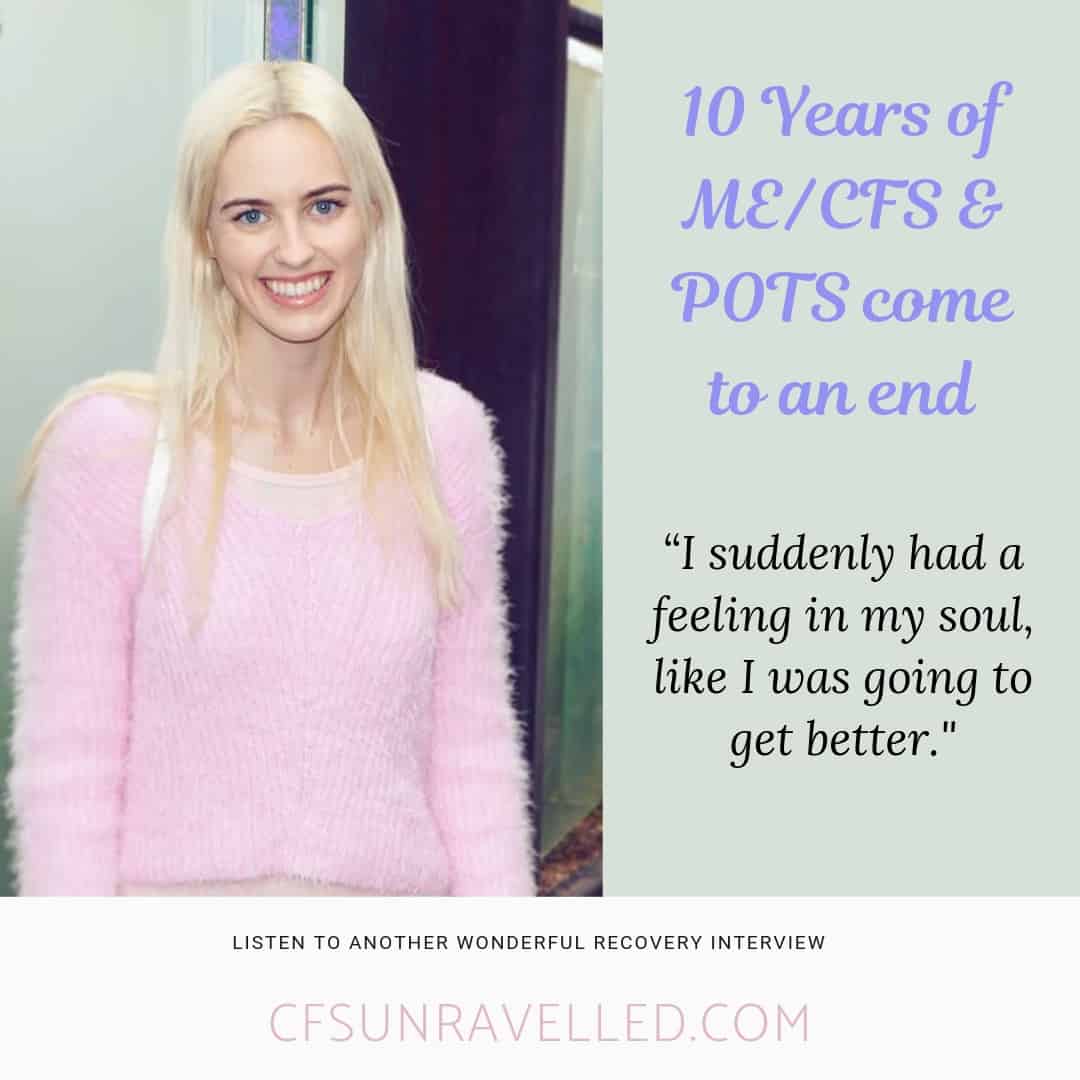
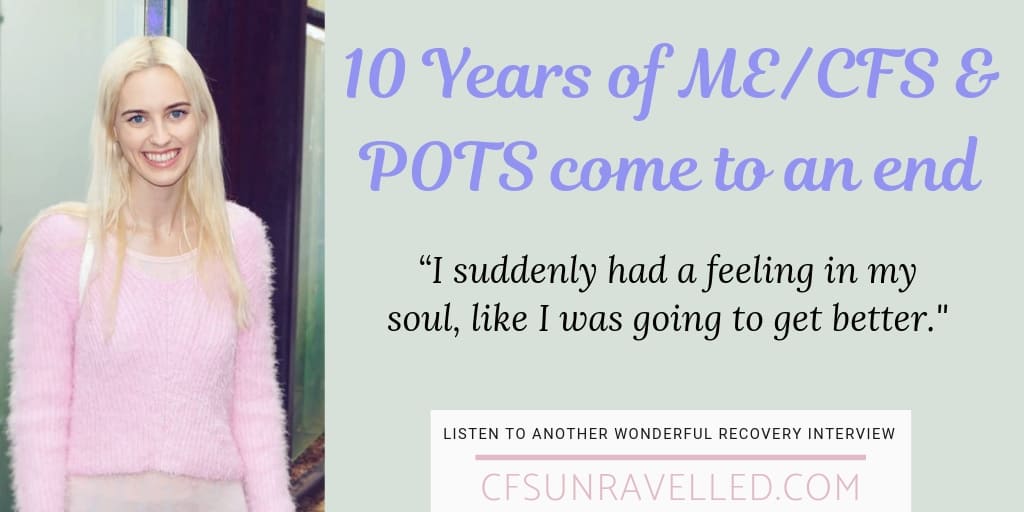
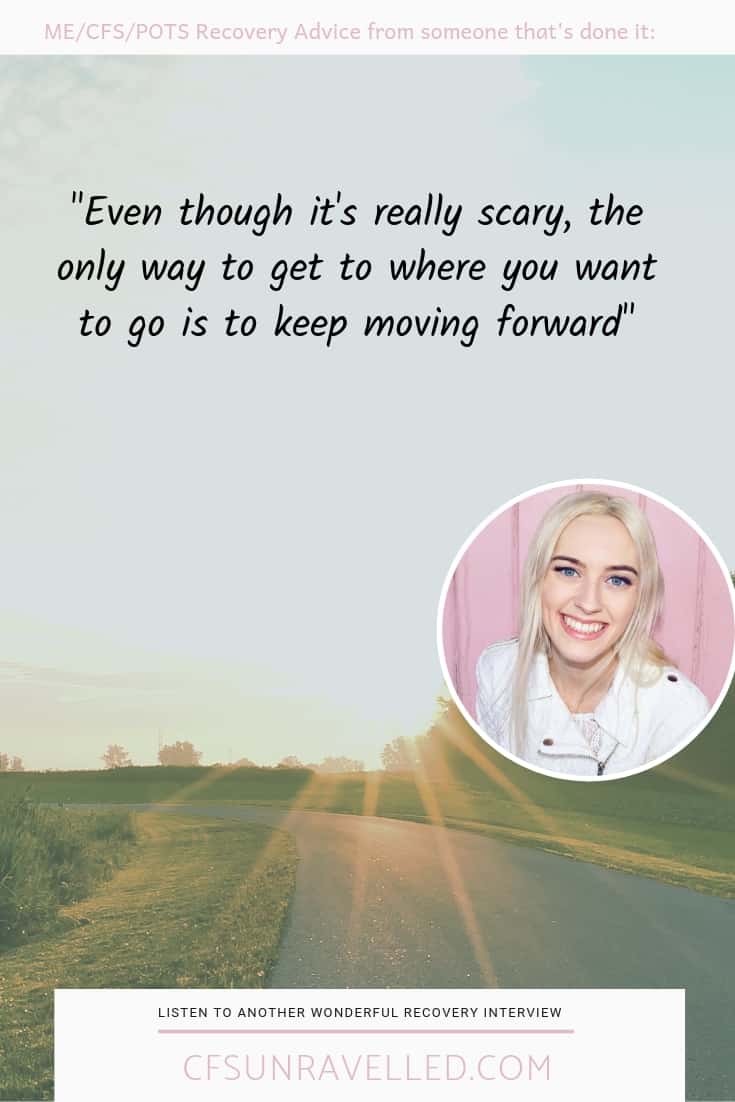
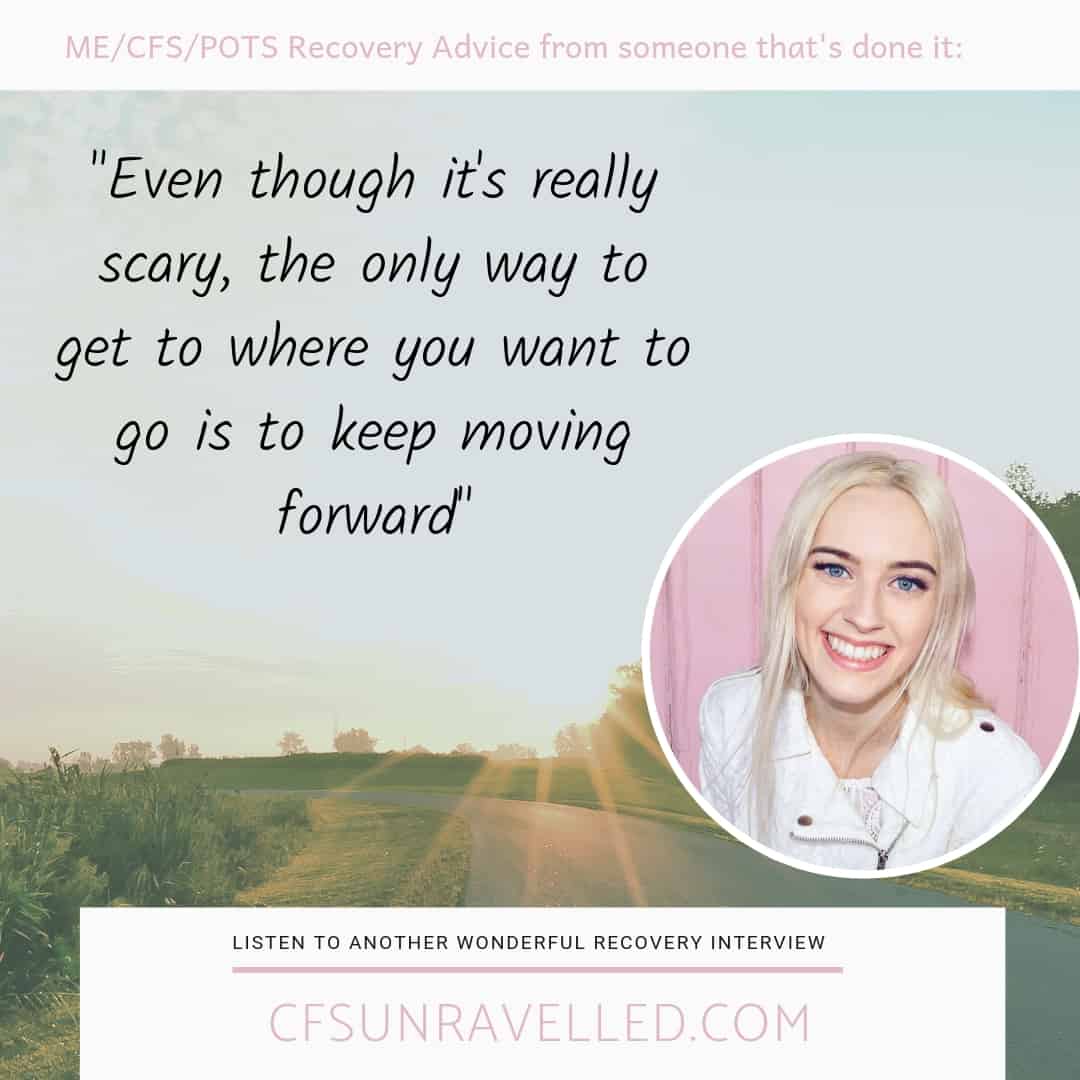
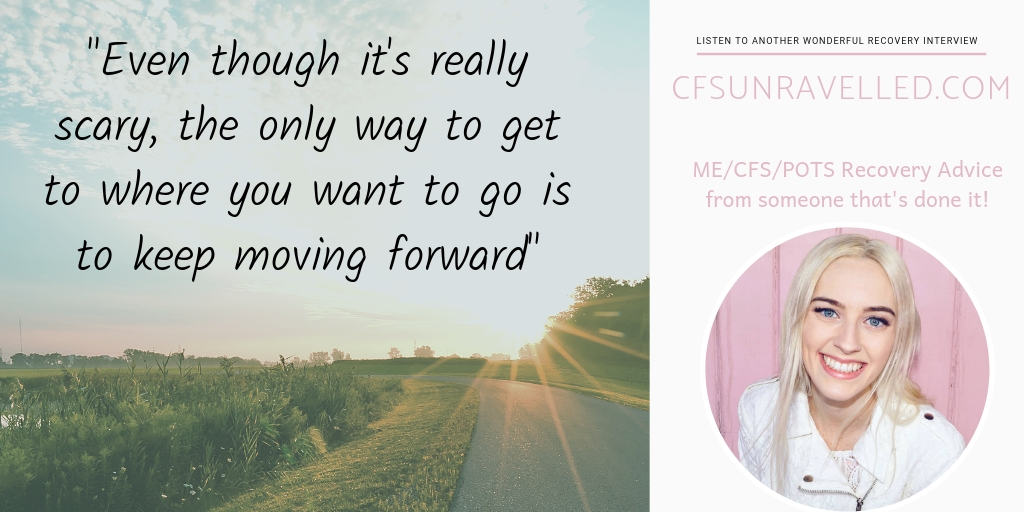

Thank you for sharing Kiki, that was really inspirational, gives me hope!
Very inspirational story.
Imaging 3 hard diagnoses like this, at this young age..
I had my cfs diagnosis with end of my 20’s and this is hard enough for me, but as a teenager this 3 illnesses, very tough.
You probably wouldve skiped this time if you could but I’m sure this experience strengthen you for the rest of your life.
I liked your interview and your shyness. you got a beatiful smile. 🙂
Just wanted to say that I’m impressed with your strength and hope you will have a long, happy and healthy life.
Thank you Kiki and Dan, it’s always good to hear that recovery is possible even after a long illness.